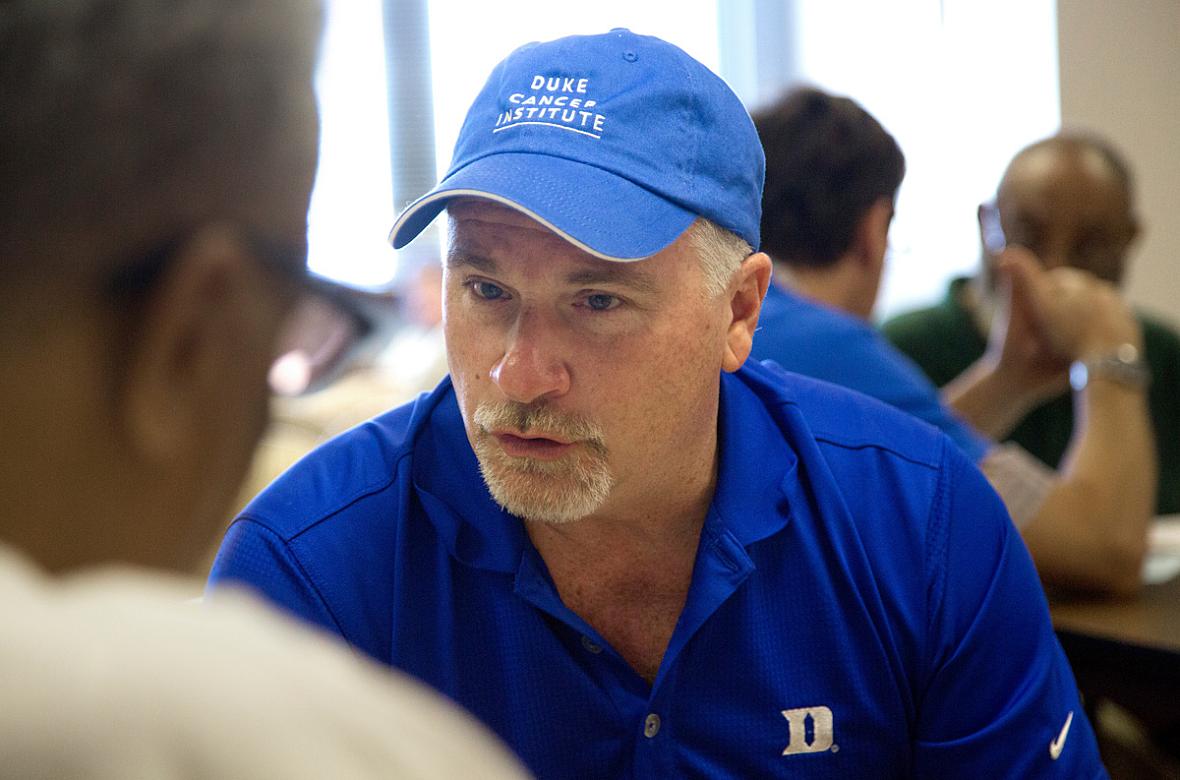Duke expert: New prostate screening guidelines not accurate
This series, originally published in The News & Observer, was produced with support from the Dennis A. Hunt Fund for Health Journalism, a program of the USC Annenberg School of Journalism's California Endowment Health Journalism Fellowships.
Other stories in this series include:
Prostate cancer attacks NC black men at startling rate
Change in screening guidelines incites confusion
UNC expert: Regular care is key to prostate cancer diagnosis
In poor, rural South, reaching black men at risk for prostate cancer is difficult
NC barber has 30 good reasons not to ignore prostate cancer symptoms
North Carolina state official: Funding to fight prostate cancer is tight

Steven Patierno, deputy director of the Duke Cancer Institute, was appointed to the North Carolina Advisory Committee on Cancer Coordination and Control by Gov. Pat McCrory. Shawn Rocco/Duke Medicine Photography
DURHAM
Steven Patierno, deputy director of the Duke Cancer Institute at Duke University, was appointed to the North Carolina Advisory Committee on Cancer Coordination and Control by Gov. Pat McCrory. This conversation with him from earlier this spring has been edited for brevity.
Q: The screening controversy is something I wanted to ask you about.
A: We all know what happened when the U.S. Preventive Services Task Force made its announcement three years ago about the lack of evidence for prostate cancer screening, and the suggestion that screening is not helpful, that … screening introduces a risk all by itself that it’s potentially detrimental.
That has almost categorically now been shown to be incorrect. Those analyses were based on evaluation of studies that only followed men for a relatively short period of time after the screening. ... They were modeled after the time course that you typically see for cancers like breast and colorectal cancer ... and didn’t take into account the indolent, slow-growing nature of prostate cancer. And now those same studies have been re-evaluated following men at eight, nine, 10, 11 and, I think, up to 12 years now after screening. And there is now a definitive difference on the side of screening having a positive impact on disease detection and survival.
Q: Even if you were going to use those studies to create guidelines, could you have really been able to tell from those studies what the recommendations should have been for African-American men?
A: Well, they did not include black men, so by definition they were not accurate. Now we know, three years hence, they were not only inaccurate, they were wrong. Not because they had malicious intent, they just didn’t recognize the indolence of prostate cancer and didn’t wait long enough to see if the curves would bifurcate between screened and unscreened.
Q: You’re also studying the genetic aspects of the disparity?
A: We have some really, really exciting results coming out. We have identified some of those molecular pathways that are driving the aggressiveness of prostate cancer in African-Americans. It turns out that by using the difference between blacks and whites, it becomes a surrogate for tumor aggressiveness in general, and we’ve been able to determine [that] some of those pathways are what drive tumor aggressiveness in general, regardless of race, and we have found pathways that open up possibilities for prevention, and prevention trials, particularly among African-Americans.
We have made at least three discoveries of novel pathways and novel potential targets for treatment as well, [which] might give us headway and clues into a couple more potential Achilles’ heels of this aggressive form of prostate cancer that may open new ways to treat prostate cancer.
Q: Ways to attack the cancer cells?
A: Yes, exactly, and so it’s a very, very exciting time for us right now.

